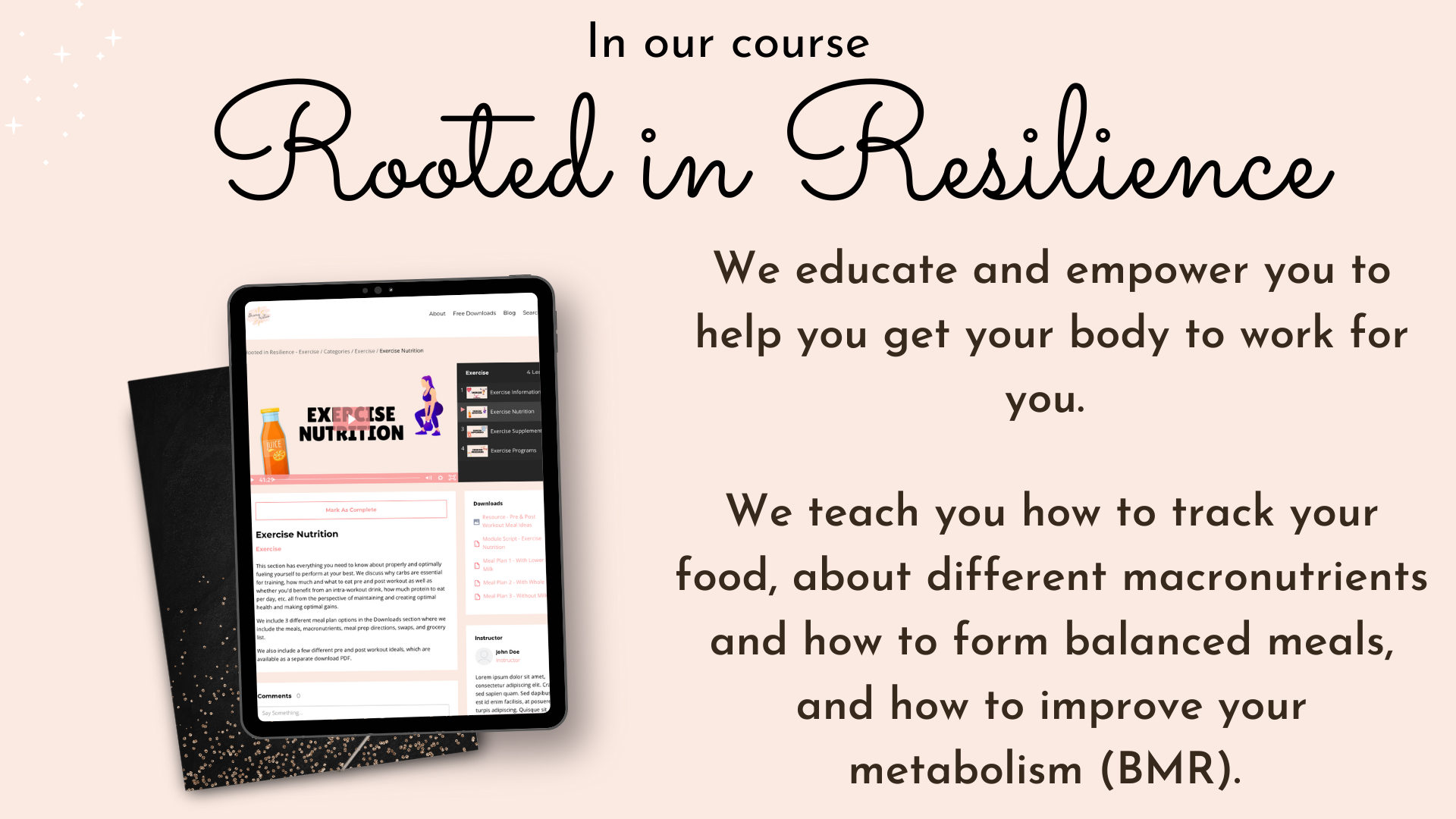Do this before trying to lose weight
Aug 04, 2022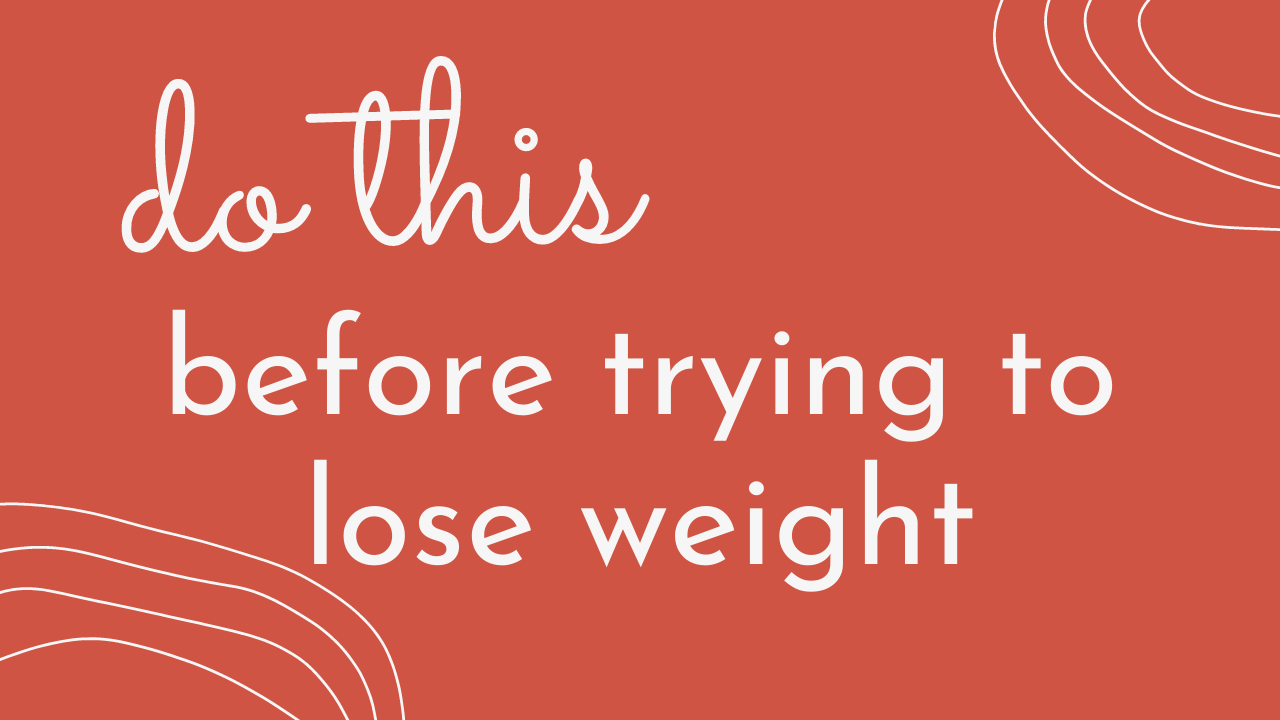
If you want to lose weight, you should first work on improving your habits. Doing so will make weight loss in the future so much easier and more sustainable.
So your main goal should be to master the basics and implement healthy habits - which we will discuss in depth in this blog post.
If you aren't implementing the habits we list out below, do not try to lose weight right now.
Without implementing these things first - you will likely need to consume a very small amount of calories to lose weight - which is not sustainable and will negatively impact your metabolism in the long run.
Let's briefly discuss a hypothetical situation. Let's say at one moment in time (Point A) maybe you have down regulated your metabolism or have unbalanced hormones so your maintenance caloric intake is around 1600 calories (meaning you maintain your weight consuming this amount of calories). But then 3-6 months later (Point B) after implementing some lifestyle and nutrition changes (discussed below) your new maintenance is 2200 calories (again, this is hypothetical). You can then diet at a higher calorie intake relative to Point A.
By working on improving how your body works as a whole (improving your metabolism and thyroid system), we can increase your energy expenditure.
Thus, when it's time to lose weight, you can diet at a higher caloric load (making the whole weight loss phase more enjoyable and sustainable). Who wants to eat 1200 calories to lose weight? This is not healthy and is not necessary.
You do, however, need to meet your body where its at and work slowly from point A to point B. How do we do that?
Let's dive in.
As we discussed in our previous blog post (how to lose weight), following the Law of Thermodynamics (energy cannot be created or destroyed) - you must be in a caloric deficit to lose weight. Yes, there is of course nuance (which we discuss in the other blog post), but we must create an energy deficit which depends on a number of variables.
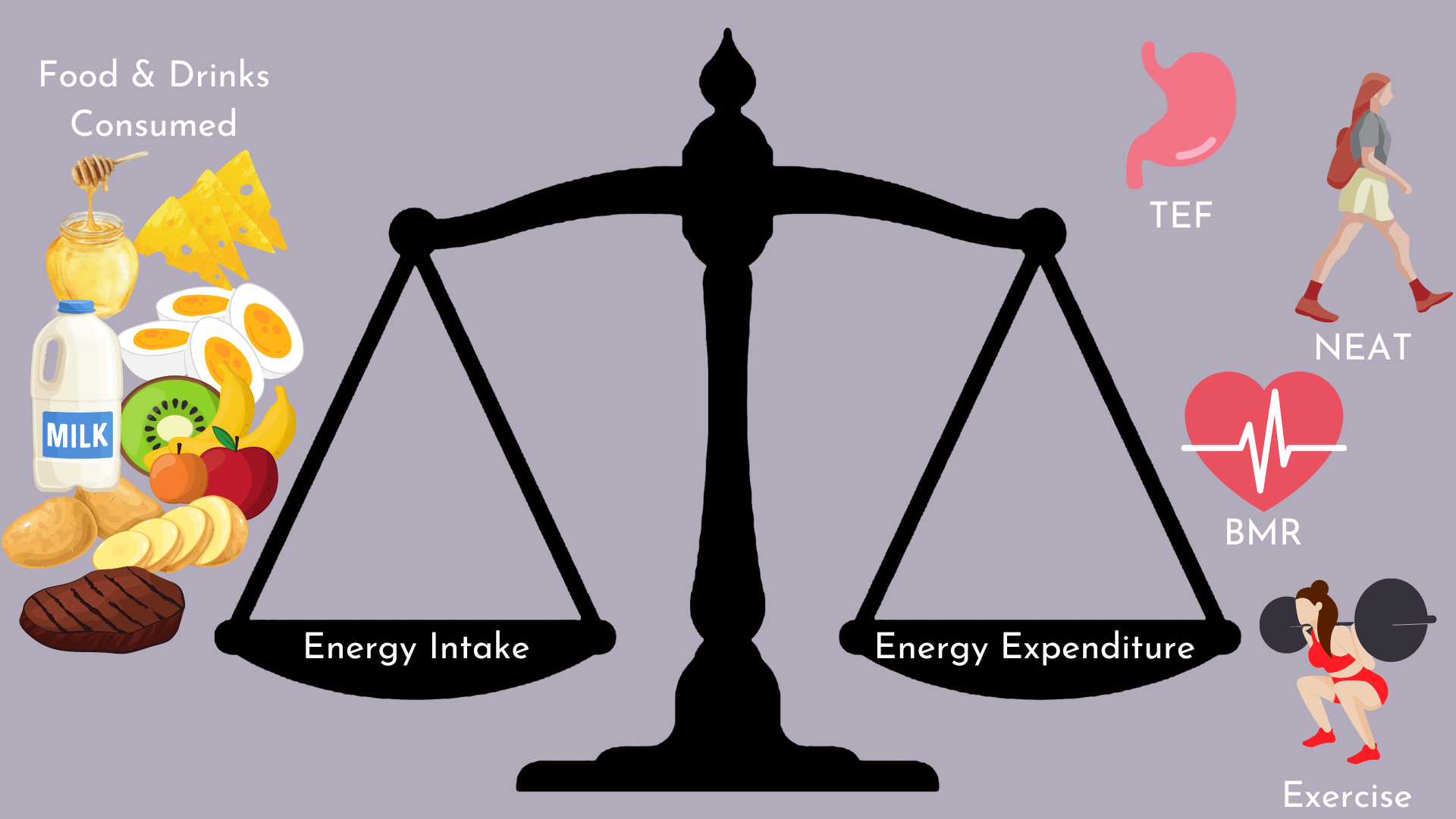
Your energy intake (calories consumed) equates to all of the calories you consume from food and liquids.
Your energy expenditure (the calories you 'burn') is the sum of
- Your basal metabolic rate (BMR)
- Non Exercise Activity Thermogenesis - NEAT (body movements outside of planned exercise, like fidgeting, doing laundry, etc.),
- Exercise
- Thermic Effect of Food (TEF) - the amount of calories your body uses to digest the food you consume
The more we can increase our metabolism and energy expenditure, the more food we can eat during a weight loss phase.
Let's build up the right side of the scale before decreasing the left side (reducing food intake).
The image below (from ref) demonstrates the relative contribution of the above 4 items on your total energy expenditure. As you can see, your NEAT and BMR are the largest contributors to your energy expenditure. Thus, these should be the two things we try to improve before entering a weight loss phase.
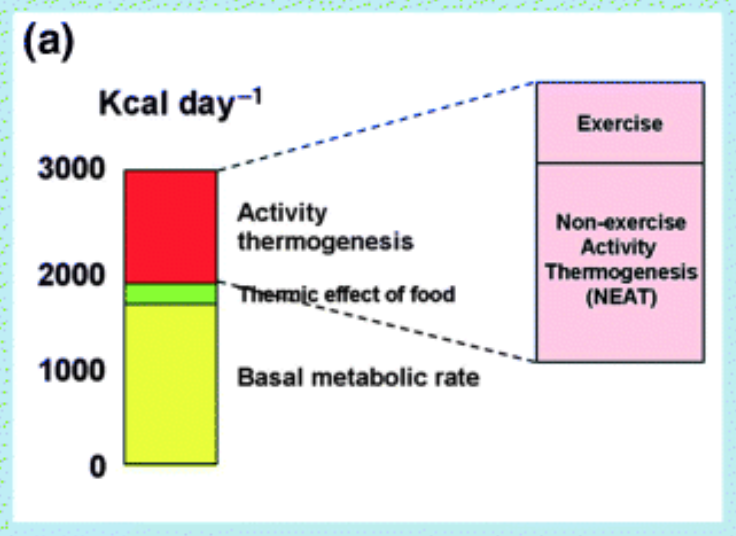
How do we increase our BMR? (Basal metabolic rate) (another way of asking this question is - how do we improve our metabolism?) Eating a bunch of food doesn't increase our BMR - changing our dietary and lifestyle habits will.
This is the whole goal of the 'pro metabolic' aka Ray Peat diet! However there seems to be a misconception that
All of the habits we will list below will help you improve your metabolism and either help you increase your BMR or NEAT/exercise energy expenditure levels.
If you want more guidance on how we can optimize your nutrition and lifestyle habits to maximize your BMR, we teach you how to do this in our course, Rooted in Resilience.
Habit #1: frequent walks and movement throughout the day
High activity levels play a major role in having a healthy metabolic response - we respond to strength training better and we improve how our body responds to the food we eat by lowering blood lipids and improving our insulin response.
Individuals who participate in habitual physical activity can maintain lower body fat and a higher BMR than sedentary controls with similar body mass, FFM, and body mass index. (ref)
There are so many studies in the literature documenting that frequent movement throughout the day is vital for a healthy metabolism. In fact, some studies are now showing that we do not get the health benefits of a workout unless we are active throughout the day, not just in the workout. Meaning, if you workout for 30 min - 1 hour a day, and then sit the rest of the day - you actually aren't getting the health benefits (such as improved fuel utilization) of that workout! You are wasting your time.
Planned workouts + movement throughout the day (rather than just 1 workout then sitting the rest of the day) is the best way to maximize health improvements and fat loss from exercise. This is commonly referred to as 'Exercise Snacks' in the literature, and is illustrated in the image below from ref.
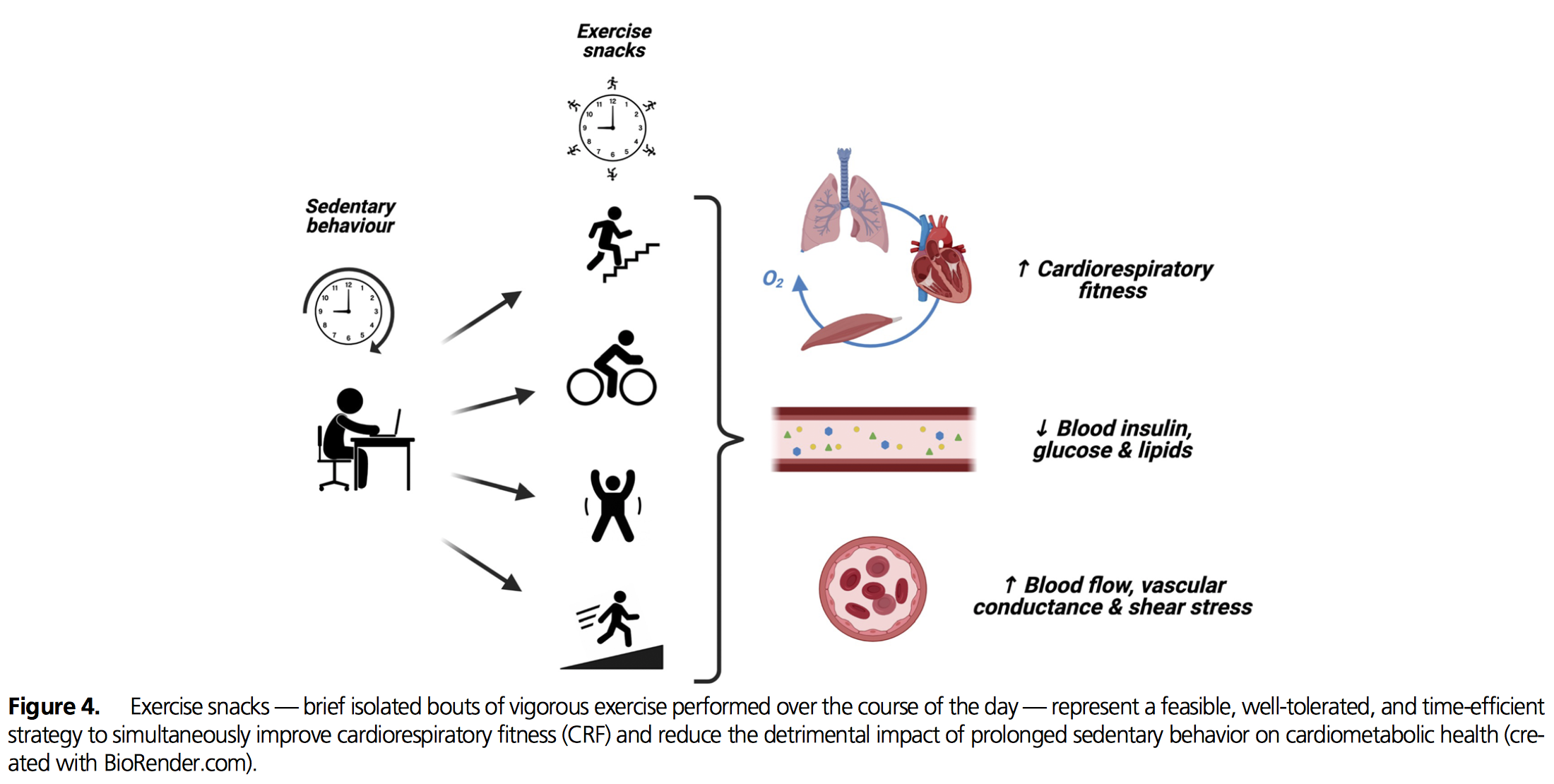
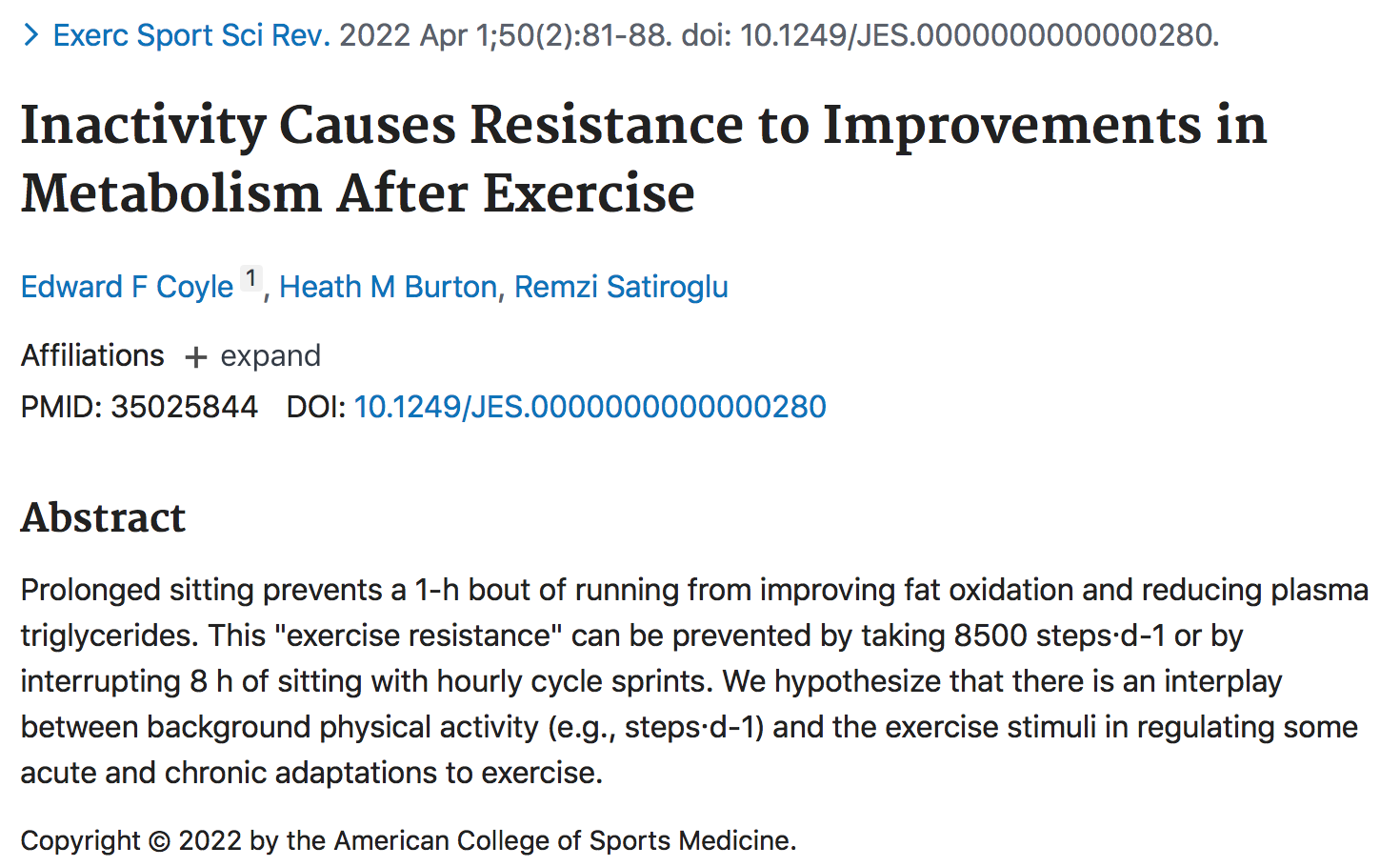
“Prolonged sitting prevents a 1-h bout of running from improving fat oxidation and reducing plasma triglycerides. This “exercise resistance” can be prevented by taking 8500 steps·d−1 or by interrupting 8 h of sitting with hourly cycle sprints." (ref)
“Two benefits of acute exercise are the next day's lowering of the postprandial plasma triglyceride response to a high-fat meal and increased fat oxidation. However, if activity levels (daily steps) are very low, these acute adaptations to exercise do not occur. This phenomenon has been termed "exercise resistance". When participants took 5000 or fewer daily steps and despite performing a 1-h bout of exercise, they displayed a 16%–19% decrease in fat oxidation and a 22%–23% increase in postprandial plasma TG excursions the next day compared with NORMAL (approximately 8500 steps per day; P < 0.05). Therefore, it could be recommended that for optimal fat metabolism, people do not reduce their step count below approximately 8500 steps per day, even if they are additionally exercising at a moderate intensity.” (ref)
“These data indicate that physical inactivity (e.g., sitting ~13.5 h/day and <4,000 steps/day) creates a condition whereby people become "resistant" to the metabolic improvements that are typically derived from an acute bout of aerobic exercise (i.e., exercise resistance). In people who are physically inactive and sitting for a majority of the day, a 1-h bout of vigorous exercise failed to improve lipid, glucose, and insulin metabolism measured the next day.“ (ref)
This study shows that the frequency of movement increased fat loss and improved insulin sensitivity more than a lower frequency of movement despite having the same level of training volume.
There are so many other studies documenting the benefits of just being active throughout the day. We are not saying run all day long - but try to walk more!! It is a low stress movement that yields drastic health benefits.
How to implement regular movement into your lifestyle: either plan walks into your schedule, or where a step tracker and shoot for minimum 8k steps a day (10k-12k would be a great goal to move towards!)
One habit change that can make this shift easier (without setting reminders on your calendar) is to make it a priority to take a walk after each meal & snack! This will also improve digestion of that meal.
Habit #2: strength train to build muscle
Studies have shown that increased muscle mass increases skeletal muscle glucose uptake and improves insulin sensitivity. (ref)
Having more muscle mass increases our BMR - meaning our body burns more calories at rest (increasing our energy expenditure).
The best way to build muscle is to implement smart training.
The Lifestyle & Exercise module of our course teaches you on how to build muscle, and includes a number of workout programs (with new ones added every few months).
Habit #3: track your food and learn about macronutrients
Many people will say this is restrictive and an 'eating disorder'. But if you didn't track your food before, why are you now at a place where you want to lose weight? Was your previous approach working for you? What is the downside in temporarily tracking your food to get a better understanding of properly fueling your body with the right macronutrient balance?
If we compare our caloric intake to our finances - isn't it a good idea to keep a budget? So that you can make better decisions about future expenses? There is also a general trend that once you start tracking, you make better food choices. "When you observe something, you change behavior". Who wants to track eating a Twinkie and candy bar?
Tracking your macros will allow you to eat enough protein (required to build muscle) and to be mindful of your fat intake (which is easy to over consume!!). We do not want to consume high fat and high carb, which allows us to easily over consume calories and a high fat intake can negatively impact how we utilize carbohydrates. (ref, ref)
We teach you how to track your macronutrients and share ideal macro targets for body recomposition and weight loss in the Nutrition section of our course.
Track your food for a week to gauge what your current caloric intake is. This will help you make better decisions during your future weight loss phase.
Habit #4: stop eating processed food & start cooking most of your meals
Processed food and most take out/restaurant food can be very energy dense and micronutrient poor. You will truly not make significant progress long term if you do not start cooking most of your meals (eating out a few times a week is fine!) Most food at restaurants are high in carb and fat, and low in protein - things we do not want! Most processed food are also filled with preservatives, gums, dyes & fillers - all of which can negatively impact your gut health overtime, which will hinder energy production and metabolism.
Habit #5: eat breakfast
Those who eat a big breakfast burn twice as many calories (have an improved BMR) relative to those who don't eat breakfast or eat a small breakfast and eat a large dinner. (ref) Your diet induced thermogenesis is 2.5x higher in the morning relative to the evening. Those who eat breakfast also experience fewer cravings and have healthier blood glucose and insulin patterns (ref).
You just fasted for 8-10 hours - eat your breakfast.
Habit #6: consume adequate dietary calcium
It has been demonstrated that each 300 mg increment in regular calcium intake is associated with approximately 1 kg less body fat in children and 2.5–3.0 kg lower body weight in adults. (ref) A higher calcium diet was also shown to be more effective in reducing abdominal fat in subjects with Type 2 diabetes relative to a lower calcium diet. (ref)
Calcium may influence body fat levels due to its effect on BMR (ref) due to the enhancement of thermogenesis and reduction in fat synthesis. (ref)
So, make sure you are regularly eating milk, cheese, yogurt, or well cooked dark leafy greens for the metabolic enhancements of dietary calcium.
Habit you need to stop: cutting carbs & seeking a quick fix
Cutting carbs does not automatically = weight loss. For some people, restricting an entire macronutrient will help them lower their caloric intake, which can lead to temporary weight loss. But you don't have to cut carbs to lose weight. That is simply not true - increasing fat oxidation does not increase weight loss. (ref) You can still burn fat when including carbohydrates in your diet. The anti calorie folks won't like this - but calorie intake matters.
For many, their hormones and metabolism will crash, and this restrictive approach can lead to a never ending binging cycle where progress is made, lost, made, lost, etc.
Stop the restriction! You DO NOT have to restrict carbs to lose weight. Tracking your food intake is the BEST way to ensure adequate weight loss while minimizing metabolism down regulation.
Something to keep in mind is that while everyone's metabolism will be slightly lowered when dieting (this is why one can stall with weight loss after a period of time - and thus requires an adjustment in caloric intake or energy output), consuming carbs while eating in a caloric deficit leads to LESS of a metabolism reduction due to higher thyroid functioning. In clinical studies a calorie restricted, low carb diet depresses Thyroid hormone T3 levels similar to starvation, where a calorie restricted diet with carbs does not (ref). Not consuming many carbs leads to low T3 production (ref) since T3 production is dependent on liver glucose and glycogen status (ref). And our T3 level is inextricably related to cellular CO2 production and metabolic rate (ref). Your thyroid is your master metabolic regulator. Yes your body can function with lower levels of T3 - but that is not optimal. Over an extended period of time, a down regulated thyroid will have negative implications on your BMR - and non essential functions (like hormone production, hair and skin health) will be down regulated.
Healthy fat loss (that is sustainable and lasts - meaning you don't rebound and regain weight quickly) is not sexy or quick. It takes patience - play the long game!
Focus on mastering the basics of healthy habits (essentially - eat real food and make regular movement a part of your lifestyle), so that your body is better at using the energy (food) you consume. As a result of an improved metabolism, you will be able to eat more food (slowly over time) and maintain your weight. Which is what we want!
Next, you can enter a temporary weight loss phase (if weight loss is still your goal at this point). We talk about how to lose weight in this blog post.
Learn more about our course here.

